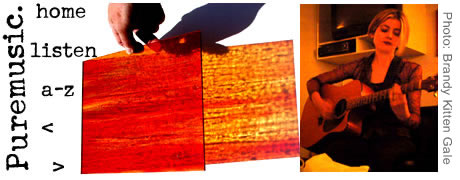
A Conversation with Anne McCue (continued)
PM: You're an avid and more than able guitarist. And--no sexism intended--I've rarely seen a female using as big a pedal board as you do.
AM: Ah, yeah. [laughs]
PM: Let's talk about what you're using, pedal-wise.
AM: Okay. Well, I've got an analog delay pedal. It's an old delay pedal. I think it's a Boss--or Roland. Should I look? I can tell you later.
But it's red. And it's just an old--obviously it's analog, so it's got a warmer kind of sound to it. And it could be a 70s one, actually. I know they're worth quite a bit of money now, those. I picked it up for like $40, but I think they're worth a couple of hundred dollars. And the same with my flanger. That's a pretty old flanger I've got.
PM: That had a good sound.
AM: Yeah. It's good on acoustic guitar. That's what I use it for. And my chorus pedal is pretty old, too, the Boss chorus.
PM: The old CE-2, the blue one.
AM: Yeah. And then I've got a Wah-Wah pedal. It's a Jimi Hendrix Wah. I'd be interested to play a different kind of one, actually. Maybe a Morley or a Vox, or whatever.
PM: Yeah. The Buddha is really nice too.
AM: Oh, yeah.
PM: I have one of those, yeah.
AM: And then Danelectro just gave me some pedals. I got a tremolo pedal. It's a really good pedal. A Danelectro tremolo.
PM: It's the best one.
AM: Yeah.
PM: I just bought one too. Yeah, Kenny Vaughan told me recently, he said, "Frank, for a tremolo pedal, the best one is the cheapest one, this Danelectro." He said, "And I have them all, including the Cesar Diaz $250 Tremodillo."
AM: [laughs]
PM: He said, "And the $50 one is the best." So if Kenny Vaughan says a pedal is good, I just buy it. He was a Lucinda guitar player for a long time.
AM: Yeah. I saw him. He's amazing. And I got a Leslie speaker pedal from Danelectro as well, a Leslie pedal. I can't remember if it's called a Milkshake or--
PM: Yeah, they've got hilarious names for their pedals. Does that work worth a damn? Does it sound like a Leslie?
AM: Yeah. It's even got the noise.
PM: [laughs]
AM: [laughs] And I got a Tube Screamer distortion.
PM: Yeah. You're not afraid to use it, either. Last night when you played "Who Do You Love" and a couple other things, and you hit that pedal, I thought, "Well, she's no stranger to distortion."
AM: I'm happier when I use distortion, because that's where I started. I started in a thrash band. It ended up being heavy rock. But when we first started, I couldn't play that well, so it was thrash. But I got used to having a distortion sound, and I was scared to play clean for a long time. So once I put my distortion on, I'm really comfortable.
PM: [laughs] You're back to your thrash roots.
AM: [laughs] Yeah, because it hides stuff. You know, you put a pedal on like that, and you can almost play anything and it sounds like rock 'n' roll.
PM: That's true. So that's all your pedals, right?
AM: For the moment. I'm always looking for new stuff. I've got too many pedals to plug them all in at once. And it's kind of ridiculous, you know, so...
PM: You need one of those Pedal Power units that accepts eight of them.
AM: I need two of those.
PM: That's a lot of pedals, folks.
AM: But I'd like to get all those different ones, you know. There's so many great pedals. Richard Thompson had one pedal. [laughs]
PM: The Rotovibe.
AM: Yeah. He looked at my pedal board, and he goes, "Oh, you've got a lot of pedals."
PM: [laughs]
AM: But I just use them every now and then for textural differences, to make it more interesting to my ear. I think it's good, you know, especially if you're playing solo or three-piece. I think it's good to have all different textures coming in.
PM: Did you happen to notice how much he was using his Rotovibe?
AM: I only noticed it once.
PM: Wow. What a rat.
AM: One song. Yeah. continue
print (pdf) listen to clips archives puremusic home